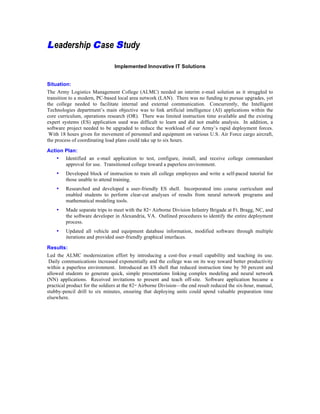Implemented Innovative IT Solutions
- 1. Leadership Case Study Implemented Innovative IT Solutions Situation: The Army Logistics Management College (ALMC) needed an interim e-mail solution as it struggled to transition to a modern, PC-based local area network (LAN). There was no funding to pursue upgrades, yet the college needed to facilitate internal and external communication. Concurrently, the Intelligent Technologies departmentŌĆÖs main objective was to link artificial intelligence (AI) applications within the core curriculum, operations research (OR). There was limited instruction time available and the existing expert systems (ES) application used was difficult to learn and did not enable analysis. In addition, a software project needed to be upgraded to reduce the workload of our ArmyŌĆÖs rapid deployment forces. With 18 hours given for movement of personnel and equipment on various U.S. Air Force cargo aircraft, the process of coordinating load plans could take up to six hours. Action Plan: ŌĆó Identified an e-mail application to test, configure, install, and receive college commandant approval for use. Transitioned college toward a paperless environment. ŌĆó Developed block of instruction to train all college employees and write a self-paced tutorial for those unable to attend training. ŌĆó Researched and developed a user-friendly ES shell. Incorporated into course curriculum and enabled students to perform clear-cut analyses of results from neural network programs and mathematical modeling tools. ŌĆó Made separate trips to meet with the 82nd Airborne Division Infantry Brigade at Ft. Bragg, NC, and the software developer in Alexandria, VA. Outlined procedures to identify the entire deployment process. ŌĆó Updated all vehicle and equipment database information, modified software through multiple iterations and provided user-friendly graphical interfaces. Results: Led the ALMC modernization effort by introducing a cost-free e-mail capability and teaching its use. Daily communications increased exponentially and the college was on its way toward better productivity within a paperless environment. Introduced an ES shell that reduced instruction time by 50 percent and allowed students to generate quick, simple presentations linking complex modeling and neural network (NN) applications. Received invitations to present and teach off-site. Software application became a practical product for the soldiers at the 82nd Airborne DivisionŌĆöthe end result reduced the six-hour, manual, stubby-pencil drill to six minutes, ensuring that deploying units could spend valuable preparation time elsewhere. ┬Ā

